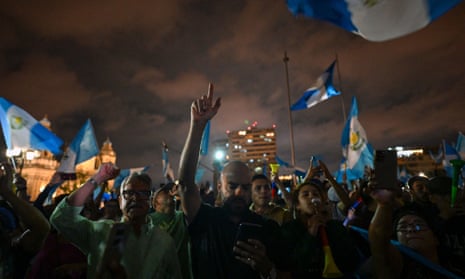In August, I packed into Guatemala City’s Constitution Plaza alongside thousands of others to watch Bernardo Arévalo, a bookish anti-corruption reformer, give his closing presidential campaign speech. There was something surreal about seeing Arévalo take the stage and make earnest appeals about curbing corruption and governing for the majority as the crowd roared applause.
The Guatemalans I have met are usually cynical about politics and politicians – for good reason. After years of rule by a bloody anti-communist military dictatorship, Guatemala became a democracy in 1985. But corrupt political machines, self-serving business elites and criminal mafias loomed large over every election afterwards.
Since 2019, these forces – startled by the judiciary’s progress investigating corruption – have been tightening the screws on opposition. President Alejandro Giammattei, elected in 2019, concentrated an unprecedented degree of power. Practically everyone I met in Guatemala feared they would soon be living in an authoritarian mafia state. Friends went into exile. Others had bags packed.
It was remarkable that Arévalo made it on to the ballot in that context – and even more remarkable when he came out 20 points and nearly a million votes ahead of his establishment rival. No one, not even members of Arévalo’s upstart party, Seed Movement (Semilla), saw it coming. It was a powerful expression that most Guatemalans believed that their democracy – no matter how severe its flaws – was still worth saving, even as elsewhere in Latin America, the power of anti-democratic demagogues and corrupt lawmakers seemed only to grow.
But Arévalo’s win was just the start of Guatemala’s fight for democracy. It’s been an uphill battle since. Prosecutors and most of congress banded together to launch a slow-motion coup, trying anything and everything to tie Arévalo’s hands and even block him from taking office.
Prosecutors opened spurious criminal cases against him and his party. Without any legal authority, they declared the election results annulled. Several election officials fled the country under threat of arrest. Lawmakers passed a restrictive budget for 2024 and rushed through a raft of conservative judicial appointments, which will limit Arévalo’s ability to enact the progressive policies on which he ran. Each time lawmakers voted, hundreds of police officers flooded the streets around congress to keep the Guatemalan people at bay.
That didn’t mean Guatemalans sat idly by. Led by a powerful generations-old assembly called the 48 Cantones of Totonicapán, Indigenous Maya communities – which make up roughly half of the population – mobilized a national strike for two weeks in October, which Arévalo’s mostly urban middle-class base joined, putting pressure on the coalition behind the coup and buying democracy valuable time. It was the first time in memory that Maya communities and the urban middle class protested in large numbers together. The protests were peaceful. And although one protester was killed, the Guatemalan security forces, unlike their counterparts in Venezuela, Nicaragua or Peru, did not respond with massacres.
The Biden administration also played a critical role. Although during the cold war the United States did Guatemalan democracy much harm – and Donald Trump had no qualms with Giammattei’s more recent democratic backsliding – Biden administration officials applied unrelenting pressure and rallied partners to defend the election results. The administration imposed sanctions on hundreds of politicians and businesspeople allegedly involved in the coup, including members of the country’s wealthiest families. A powerful business association called for respecting the election results. The Organization of American States and the European Union added pressure, too.
On 13 December, the coup coalition started crumbling. After 100 of congress’s 160 members lost their US visas, they failed to muster the votes to pack the electoral tribunal with compliant magistrates who would annul the election results. The next day, Guatemala’s constitutional court issued a ruling ordering congress to respect Arévalo’s right to take office.
None of this rules out an 11th-hour play to stop the transition. Guatemalan prosecutors’ actions show they do not consider the fine print of the law a barrier to their political goal of sidelining Arévalo. If Guatemala’s supreme court grants prosecutors’ request to lift Arévalo’s immunity, they could still order him into pre-trial detention before his swearing-in, scheduled for 14 January.
More likely than not, prosecutors will succeed at eliminating his party, leaving Arévalo with even less room to maneuver in congress and dismantling a promising new political organization that gave young people and his supporters voice. Prosecutors made a bid to lift the immunity of the head of Guatemala’s elections court, seemingly preparing to prosecute her in retaliation for defending the election results. But chances are now looking up that Arévalo will at least take office.
What happens afterwards will be a bellwether for Latin America, consequential not just for Guatemala, but for the entire region. If Arévalo is blocked from governing or quickly ousted, it will be an ominous sign. Peru’s democracy is fast eroding, and others in the region are on the brink. A win by Guatemala’s coup coalition would send all the wrong signals.
But if Arévalo – despite a hostile congress, entrenched corruption and weak state institutions – succeeds at implementing his vision of a more just and less corrupt Guatemala, it will send an even more powerful message of hope: even in the context of vast inequality and rampant criminal violence, democracy can be reformed rather than discarded.
In a region where rightwing populists like El Salvador’s Nayib Bukele, Brazil’s Jair Bolsonaro and Argentina’s Javier Milei and leftist dictators like Nicolás Maduro take up much of the oxygen, Arévalo could still demonstrate that progressive reformers can succeed. At his rally in August – and at every protest since – Guatemalans have shown they are willing to believe it.
Will Freeman is a fellow for Latin America studies at the Council on Foreign Relations and holds a doctorate in politics from Princeton University
